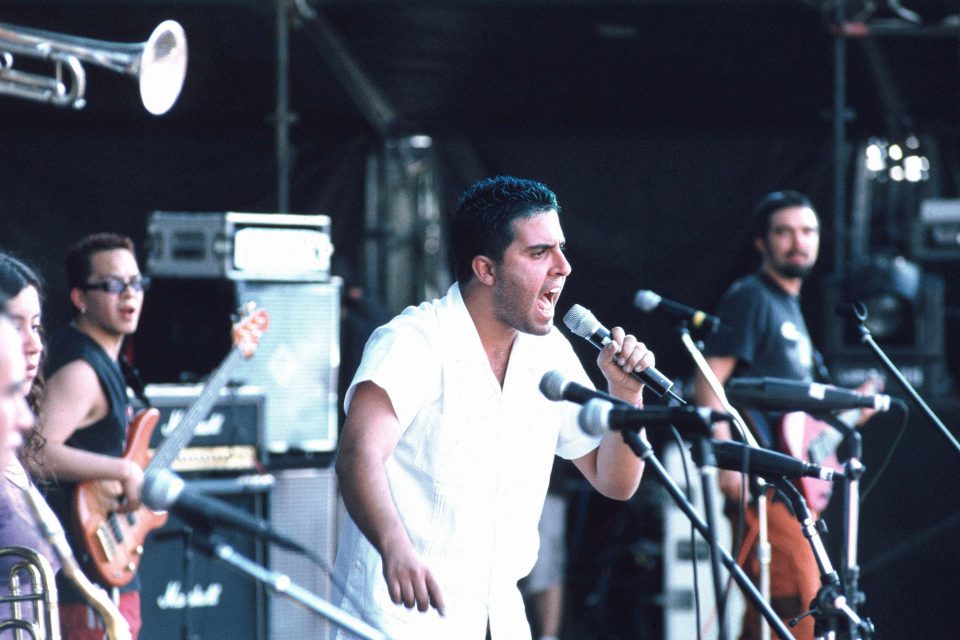Political Songs | Resistencia – Los de Abajo
Raised in politically minded families, the band members of Los de Abajo have stayed true to their leftist roots as the struggle in Mexico continues.
Author:
20 September 2019

Like church shoes on the beach, many songs with overtly political lyrics don’t work as party music, giving more party political than political party vibes. But as always, there are exceptions, and Mexican ska punks Los de Abajo are a raucous example – let’s say the musical equivalent of a pair of revolutionary red slip-slops.
Described as Mexico City’s counterparts of progressive punk rockers The Clash, four university friends formed Los de Abajo in 1992. They took their name from Mexican writer Mariano Azuela’s classic novel of the same name, which means “Those from below” but also translates as “The Underdogs”.
The novel Los de Abajo, which was written after Azuela’s experience in the 1910 Mexican revolutionary movement, inspired the band. They believe that change comes from below and their name represents their solidarity with the struggles of oppressed people across the globe, including the leftist, southern Mexican guerrillas, the Zapatista Army of National Liberation, better known as the Zapatistas.
The name stems from Emiliano Zapata, a leader of Mexico’s 1910 revolution. This indigenous peasant rebel movement took up arms on 1 January 1994, the day Mexico signed up to the North American free trade agreement. “They became instant heroes of the left, and an inspiration to indigenous groups and political romantics around the world,” is how British newspaper The Observer describes the movement that now controls much of the state of Chiapas, and effectively so.
From the beginning, Los de Abajo weren’t in it just for the party. They raised funds for the Zapatistas, gay and women’s rights movements,performed at left-wing students’ and workers’ rallies, and co-operated with other groups of free-thinkers outside the mainstream.
As drummer and founding member Yocu Arrellano explained, “The context in which we developed was this – injustice, neglect for the poor and lack of avenues for free expression.”
Trumpeter-vocalist Canek Cabrera said in an interview with the Socialist Worker newspaper: “As musicians we can’t ignore that. But we also enjoy making music for the pleasure of it.”
‘Universal medicine’
Los de Abajos say music has an important role to play in the struggles of the oppressed. “Music can work as a universal medicine for the soul,” added Cabrera. “But it’s up to artists if they want to use their music as a means of protest or social participation, we respect their decision.
“In our case it is almost mandatory. The world’s problems are too many and the solutions given by those who hold power too few. It would be insulting to those who are suffering not to bring their message to the rest of the world.”
The band members’ personal histories show the intergenerational depth of their politics. Many are from families who have been involved in left-wing political movements since the 1960s. Singer Liber Terán said in an interview with The Independent newspaper: “My parents and uncles were leaders of the student movements and militants in the Communist Party.” Guitarist Vladimir Garcia’s mother is a news reporter who was outstanding in the feminist struggle in Mexico.
Related article:
It’s not only in their lyrics that Los de Abajo reflect their outsider/underdog status.
Their music is dominated by ska. But unlike the slow, lazy version of old-school Caribbean ska from the early 1960s, their version is sped-up, knees-up and with a punk attitude. In addition, Los de Abajo’s style of music is a delicious, spicy Mexican stew that’s also made up of salsa, merengue, cumbia, punk, rap, reggae, rock and Mexican traditions such as son jarocho, northern music and banda sinaloense.
There has been a ska revival in Mexico City in recent years. Los de Abajo’s keyboard player, Carlos Cuevas, told The Independent that ska has become popular with “the humbler classes of disenfranchised youth living in the marginal suburbs of Mexico City. The aggressive style of performing ska there makes it more like hardcore punk.”
You Tube videos of the band’s concerts confirm that their wild, sweaty, high-energy music has festival crowds bouncing as if with springs under their soles.
Difficult to categorise
While immensely popular with their Mexican fans, Los de Abajo’s difficult-to-categorise hotchpotch meant local record companies showed no interest. In 1999, by then an eight-piece, the band sent demos to Luaka Bop, a record company owned by David Byrne, who in the 1980s lead the influential, post-punk American band Talking Heads.
“The group is a bit of an anomaly in the Mexican alterno-Latin scene, as they don’t really come out of being a punk band or a reggae/ska band … they come out of political commitment and activism,” said Byrne, who immediately signed them and released their international debut, Los de Abajo.
The band have since released seven albums. Despite growing global success, Los de Abajo have stayed true to their leftist roots. Founder member Terán writes many of their songs, but all the band members receive equal pay for their input. As the BBC wrote, this reflects their “democratic approach to creativity”.
Related article:
They haven’t stopped playing benefit concerts for the Zapatistas. According to Cuevas, “the 1994 Zapatista uprising branded our way of thinking. We look on ourselves as spokesmen for youth disenchanted with the world. Our parents grew up with hopes of improving the world, but now there is only savage capitalism and the globalisation of plundering.”
Resistencia, the opening track of their 2005 album, LDA V The Lunatics, features a speech by the Zapatistas’ inspirational Comandante Esther. This is the nom de guerre of one of the numerous high-ranking women in the rebel movement.
Unlike most of Los de Abajo’s music, Resistencia is a down-tempo song about the desperation of survival for the urban poor:
Ground trodden, crushed by the daily rush
For the hunger spilled
It shelters humanity
The struggle continues:
Resistance, don’t stop screaming, resistance
Resistance, don’t stop screaming, resistance


